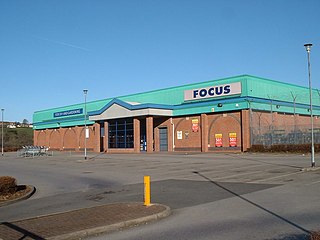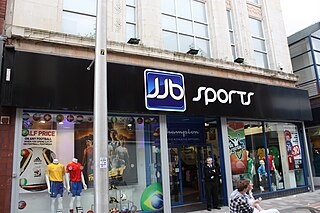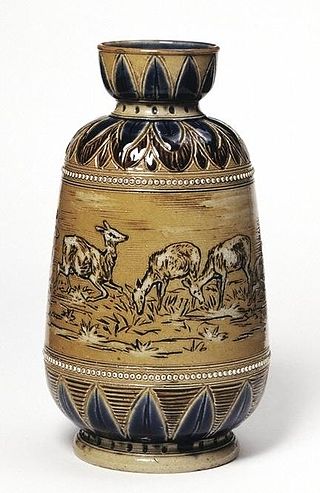Related Research Articles
EF Hutton was an American stock brokerage firm founded in 1904 by Edward Francis Hutton and his brother, Franklyn Laws Hutton. Later, it was led by well known Wall Street trader Gerald M. Loeb. Under their leadership, EF Hutton became one of the most respected financial firms in the United States and for several decades was the second largest brokerage firm in the country.

Denby Pottery Company Ltd is a British manufacturer of pottery, named after the village of Denby in Derbyshire where it is based. It primarily sells hand-crafted stoneware tableware, kitchenware and serveware products including dinner sets, mugs and serving dishes, as well as a variety of glassware products and cast-iron cookware.

GUS plc was a FTSE 100 retailing, manufacturing and financial conglomerate based in the United Kingdom. GUS was an abbreviation of Great Universal Stores, the company's name before 2001, while it was also known as the Glorious Gussies amongst stockbrokers. The company started out as Universal Stores, a mail order business created by the Rose family. In 1931, Isaac Wolfson joined the mail order company and would, through a series of takeovers, turn it into a retail, manufacturing and financial conglomerate, becoming Europe's biggest mail order firm and with over 2,700 physical stores. His son, Leonard Wolfson, followed him as chairman, to be succeeded by his nephews David Wolfson (1996–2000) and Victor Barnett (2000–2002). During the 1980s, the business divested much of its physical retail and manufacturing subsidiaries under Leonard Wolfson to concentrate on mail order, property and finance. In October 2006, the company was split into two separate companies: Experian which continues to exist, and Home Retail Group which was bought by Sainsbury's in 2016.

Focus DIY was a privately owned chain of DIY stores in the United Kingdom. It served the consumer DIY market sector, and most stores had some form of garden centre.

Belk, Inc. is an American department store chain founded in 1888 by William Henry Belk in Monroe, North Carolina, with nearly 300 locations in 16 states. Belk stores and Belk.com offer apparel, shoes, accessories, cosmetics, home furnishings, and wedding registry.

JJB Sports plc was a British sports retailer. On 24 September 2012, shares in JJB Sports were suspended, and the firm called in administrators. On 1 October 2012, it was announced that Sports Direct had purchased part of the business, including 20 stores, the brand, and its website for £28.3 million.
Jefferies Group LLC is an American multinational independent investment bank and financial services company that is headquartered in New York City. The firm provides clients with capital markets and financial advisory services, institutional brokerage, securities research, and asset management. This includes mergers and acquisitions, restructuring, and other financial advisory services. The Capital Markets segment also includes its securities trading and investment banking activities.

Wedgwood is an English fine china, porcelain and luxury accessories manufacturer that was founded on 1 May 1759 by the potter and entrepreneur Josiah Wedgwood and was first incorporated in 1895 as Josiah Wedgwood and Sons Ltd. It was rapidly successful and was soon one of the largest manufacturers of Staffordshire pottery, "a firm that has done more to spread the knowledge and enhance the reputation of British ceramic art than any other manufacturer", exporting across Europe as far as Russia, and to the Americas. It was especially successful at producing fine earthenware and stoneware that were accepted as equivalent in quality to porcelain but were considerably cheaper.

Royal Doulton is an English ceramic and home accessories manufacturer that was founded in 1815. Operating originally in Vauxhall, London, and later moving to Lambeth, in 1882 it opened a factory in Burslem, Stoke-on-Trent, in the centre of English pottery. From the start, the backbone of the business was a wide range of utilitarian wares, mostly stonewares, including storage jars, tankards and the like, and later extending to drain pipes, lavatories, water filters, electrical porcelain and other technical ceramics. From 1853 to 1901, its wares were marked Doulton & Co., then from 1901, when a royal warrant was given, Royal Doulton.

Extended Stay America, Inc., headquartered in Charlotte, North Carolina, is the operator of an economy apartment hotel chain in the United States and Canada. As of December 31, 2019, the company owned and operated 557 hotel properties consisting of approximately 61,900 rooms and franchised or managed 73 hotel properties consisting of approximately 7,500 rooms. Prior to June 2021, when the company was acquired by Blackstone Real Estate and the Starwood Capital Group, it was publicly traded as a "paired share" with ESH Hospitality, Inc., a real estate investment trust and the owner of the hotels. As of 2022, there are 650+ Extended Stay America branded hotels.

Constellation Automotive Group is a used vehicle marketplace. It was founded in the United Kingdom in 1946, as Southern Counties Car Auctions, and was a publicly traded company, BCA Marketplace, when acquired and taken private by TDR Capital in November 2019. TDR rebranded it to the current name in October 2020.

Aquascutum was a British-based luxury clothing manufacturer and retailer. It is currently owned by Shandong Ruyi.

Fairfax Media was a media company in Australia and New Zealand, with investments in newspaper, magazines, radio and digital properties. The company was founded by John Fairfax as John Fairfax and Sons, who purchased The Sydney Morning Herald in 1841. The Fairfax family retained control of the business until late in the 20th century.

Apollo Global Management, Inc. is an American global private equity firm. Founded in 1990 by Leon Black, Josh Harris, and Marc Rowan, it provides investment management and invests in credit, private equity, and real assets. As of 2022, the company had $548 billion of assets under management, including $392 billion invested in credit, including mezzanine capital, hedge funds, non-performing loans, and collateralized loan obligations, $99 billion invested in private equity, and $46.2 billion invested in real assets, which includes real estate and infrastructure. The company invests money on behalf of pension funds, financial endowments, and sovereign wealth funds, as well as other institutional and individual investors. Funds managed by Apollo have produced a 24% internal rate of return (IRR) to investors, net of fees.

The history of private equity and venture capital and the development of these asset classes has occurred through a series of boom-and-bust cycles since the middle of the 20th century. Within the broader private equity industry, two distinct sub-industries, leveraged buyouts and venture capital experienced growth along parallel, although interrelated tracks.
Sears plc was a large British-based conglomerate. The company was listed on the London Stock Exchange and was once a constituent of the FTSE 100 Index. It was acquired by Philip Green in 1999.
Furniture Brands International, Inc., was a Clayton, Missouri-based home furnishings company. The company began in 1911 as International Shoe Company with the merger of Roberts, Johnson & Rand Shoe Company and Peters Shoe Company. In 1966 the company changed its name to Interco as the result of diversification, and once the company exited the shoe business, adopted the name Furniture Brands International. Some of the brands it owned in the furniture industry included Broyhill, Thomasville, Drexel Heritage, Henredon, Hickory Chair, Pearson, Laneventure, and Maitland-Smith. In 2013, Furniture Brands filed for Chapter 11 bankruptcy and announced plans to sell most of its divisions. New owner KPS Capital Partners announced the formation of Heritage Home Group on November 25 of that year.
Brent Walker was a British company involved in property, gambling, distilled beverages and pubs. It was founded by George Walker, the brother of the boxer Billy Walker.

Brynwood Partners is an American private equity investment firm focused on leveraged buyout and other control investments.
References
- 1 2 3 4 5 6 7 8 David Bowen (21 November 1993). "Rolling over the past". The Independent . Retrieved 11 April 2011.
- ↑ David Bowen (7 April 1994). "Pension Scandal – rise and fall of an empire founded on ego and expansion". The Independent . Retrieved 11 April 2011.
- ↑ "Coloroll Ceramics". Stoke Museums. Archived from the original on 27 July 2011. Retrieved 11 April 2011.
- ↑ "Coloroll Ceramics Group". Thepotteries.org. Retrieved 11 April 2011.
- ↑ See Prior, Katherine (2012). In Good Hands: 250 Years of Craftsmanship at Swaine Adeney Brigg . Cambridge: John Adamson. ISBN 978-1-898565-09-3 OCLC 815728722, p. 133.